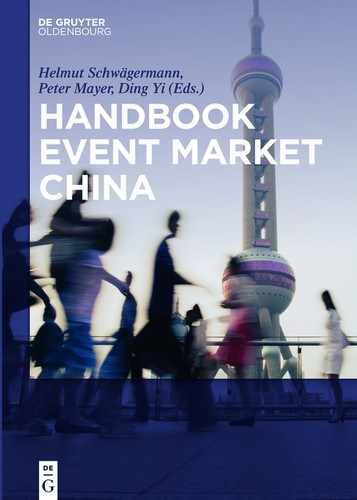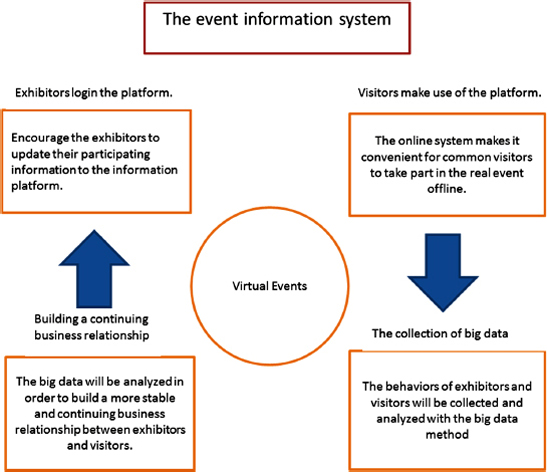The event industry and its human resources: A view based on the characteristics of the industry
After a fast-paced boom for more than 20 years, China’s Event Industry is suffering from a worsening scarcity in its human resources. The gap between the supply and demand is becoming wider in all areas of the industry, including organisers, official constructors, official freight forwarders or service agents. This article summarises the characteristics of Chinese event industry and its required human resources, and gives some suggestions on the event education and the development of the students.
The event industry is a people industry, is an industry that combines lots of practices, an industry that service is itself, and an industry that involves teamwork. The human resources of the event industry should develop planning, integrative, marketing, and executive skills. The event education should combine the theory and practice together, should cultivate internationalised talents, also it should develop the students’ capacities to use new technologies such as big data, cloud computing, internet platforms and mobile internet. As for students, the success of their future career comes from the book knowledge, communication skills and a down-to-earth working attitude.
![]()
![]()
![]()
![]()
![]()
![]()
![]()
![]()
1 Introduction
The event industry has been booming in China for more than 20 years, and now features a complete industry chain on a remarkable scale and with many benefits (Jiao 2013). According to statistics made available by China Convention/Exhibition/Event Society, 7,319 exhibitions were held, totalling an area of 9,391 square metres and a direct output of 387 billion yuan. Universities around the country have recently established Event Management as a major subject. Forty per cent of China’s students majoring in Event Management are enrolled at Guangdong, Zhejiang and Shanghai, with 5,700 in Guangdong, 3,700 in Zhejiang and 3,100 in Shanghai (CCES 2014). However, fast-growing event education is unable to meet the need for sufficiently qualified employees for the industry (Wang and Li 2011). Table 1 shows that the gap between supply and demand is very large in all areas of the event industry, be it organisers, official constructors, official freight forwarders or service agents in the event industry. Industry insiders believe it is very difficult to find project managers who are able to plan, manage and carry out whole projects independently. It is even difficult to find people who can take on part of the work, such as sub-projects.
Tab. 1: The ratio between the supply and demand of qualified employees (own calculation)

What are the reasons for this lack of qualified employees? Is the salary too low? The answer is no. Salaries have risen in line with the development of the industry. The annual pay of a project manager is several hundred thousand yuan, which is not low. The next question is: where do qualified graduates end up? Does the content of degree programmes fail to meet companies’ requirements? As a CEO of an exhibition company with 24 years of experience in the event industry, I hope that this paper will help stakeholders in the industry to find out more about the real needs of the industry, and to provide advice and thoughts on how to improve university-level event management. The following paper consists of four parts. Three issues will be discussed in the first three parts, namely the characteristics of the event industry, the demands placed on qualified employees in companies, and employees’ needs concerning the future event industry. Advice on how to develop university-level event management will be provided in the final section.
2 Characteristics of the event industry
The event industry differs considerably from other industries, which means that qualified employees should adapt to the characteristics and development of this industry to the greatest extent possible.
2.1 Events focus on people
Events are like circles, starting from contacting people, reaching a peak during the event, then continuous contacting people after the event until the next event starts. An exhibition in China usually starts from communication with the industry association and the approval from the government on the topic and the range of exhibits. Then the exhibitors and potential visitors are contacted, which takes time. During the event, visitors, exhibitors and the media come to the venue, where they can communicate with each other, and so bringing people together in the whole event process. Communication does not stop once an exhibition finishes. Face-to-face communication will continue in the form of clearing up the deals with suppliers, summarising the event and expressing thanks to the partners. This business circle repeats constantly.
Compared to other communication platforms, exhibitions feature the most direct and close contact, which is best for multilateral communication between people. Table 2 shows that events involve clients more than other platforms, such as TV, radio, shopping centres and credit cards, and involve more face-to-face communication. Although virtual events on the internet feature a growing number of the aforementioned functions, they still lack face-to-face communication and business talk.
Since events focus on people, their willingness and ability to communicate with others are obviously important. The event industry requires employees to do research, contact, serve, organise, coordinate and lead people. Meanwhile, it also requires that employees have the composure to deal with all kinds of problems maturely and appropriately.
Tab. 2: Comparison of platform participants. Source: VNU
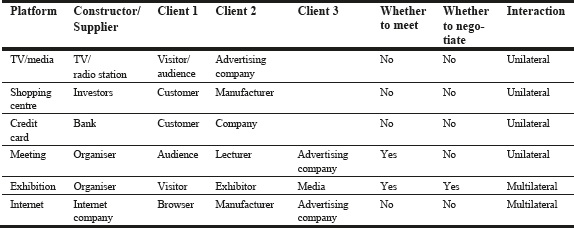
2.2 Events need practice
The event industry is an industry with a high practical orientation. Outsiders consider us to be white-collar workers in offices when they see us in suits at exhibitions. In fact, only insiders know that a lot of dirty, hard and dangerous work has to be completed beforehand. In the process of inviting exhibitors, you do not only have to sell the space successfully but also please your clients with a satisfactory service. If exhibition managers have no practical experience, it is virtually impossible to realise these two aims by learning from books alone. In the course of arranging exhibitions, project managers have to do a lot of dirty, hard and dangerous work to conduct on-site management, such as keeping a close eye on the exhibition halls all the time, preventing illegal practices and ensuring that stand decorations are not at risk of collapsing when supervising constructors. Project managers must also check the hall in order to inspect security equipment, liaise with venue workers, constructors and exhibitors, and solve all emergencies. In all, therefore, our colleagues have to walk between 10 and 15 km a day during the lead up to and opening of the exhibition. It must be ensured that everything has been organised perfectly so that everyone else is clear about matters. It therefore takes a while for a novice in the event industry to become a mature project manager.
Events cannot live without practice. Operations are related to many aspects. Wherever problems occur, the quality of an exhibition will potentially be directly affected. In order to operate a project efficiently and to prevent problems from occurring, you experience many sleepless nights, starting from two months before the opening ceremony. Figure 1 gives an accurate description of the processes that have to be considered in order to implement an event project successfully. It covers many practical aspects, from time and monetary budgeting, supplier management to previous events’ data collecting.

Figure 1: Core work performed by the operating department.
The dual education system at DHBW Ravensburg, Germany is really admirable. The school provides education for some students coming from an event company and they will go back to work in the same company after the graduation. Some students even come from companies. They usually spend three years at university – half of which is spent learning theories, and the remainder practicing. In other words, three months of every semester are spent studying theory and three months are spent undergoing practical training at event companies. Thanks to this kind of dual education system, students are able to improve their theoretical knowledge as well as their practical skills (Zhang 2004).
2.3 Event equals service
The event industry is a high-level service industry. This is because it has become an engine for economic development with a pulling effect for economic growth usually 10 to 30 times higher than in general service industries (Chen et al. 2011). Taking the result of the survey concerning Hamburg Exhibition Company (HMC) conducted by Munich-based ifo-Institute for Economic Research as an example, every euro gained from the HMC, Hamburg’s retail sales, rental industry, catering industry, hotel industry, etc. benefit from an additional 7.6 euros. A total of 266 HMC employees created 6,450 employment opportunities in the logistics industry, handcraft industry, catering industry, etc., 4,093 of which are in Hamburg (Annual Report of HMC, 2014) this is why Shanghai is building four centres: the international economic centre, the international financial centre, the international shipping centre and the international trade centre. When planning the construction of the international trade centre, the government placed much greater emphasis on the development of the event industry than ever (Xin 2010).
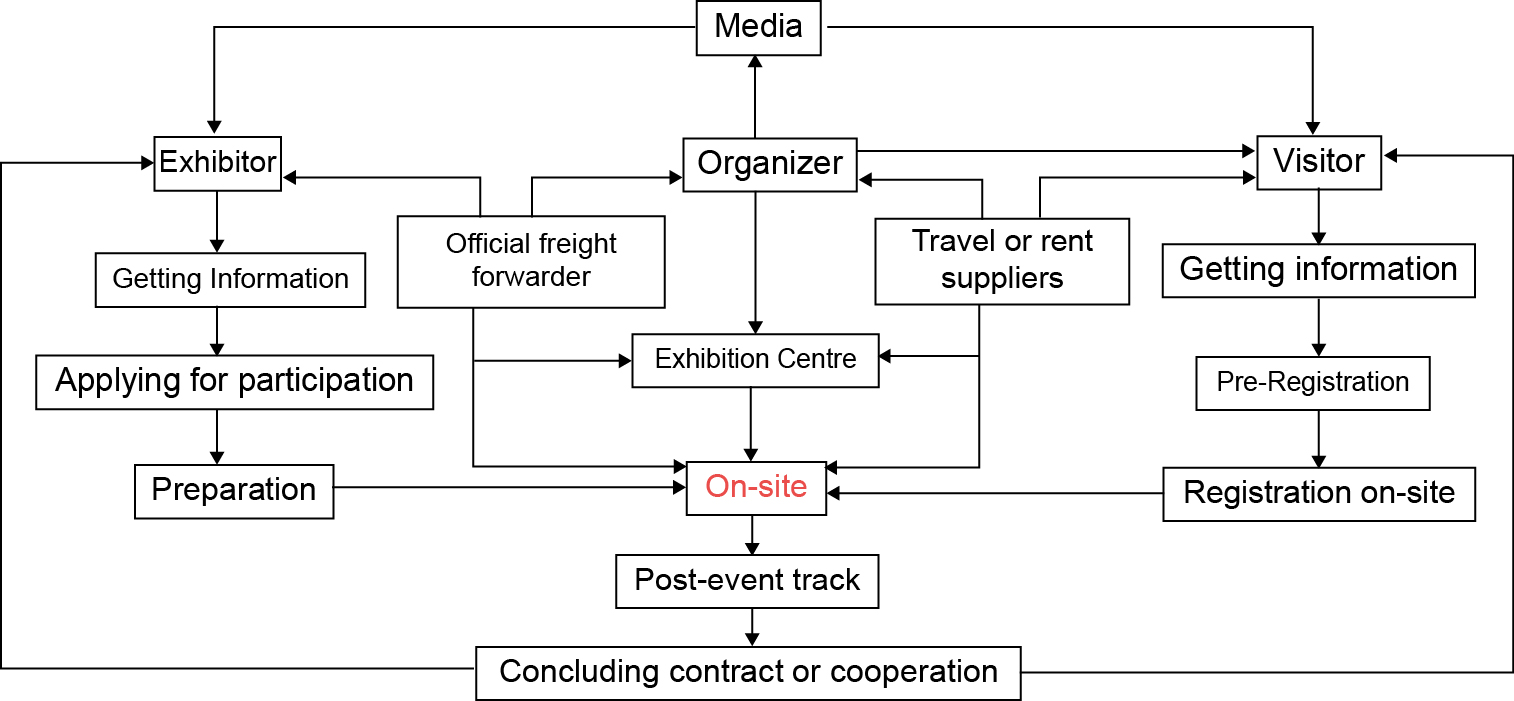
Figure 2: Service diagram of exhibitions.
Being a part of the service industry, services should be considered seriously. Willingness to help others is very important in providing good services to the organiser’s three main customers: exhibitors, visitors and the media. Figure 2 shows the whole service process provided to the three main customers by the organiser. This process takes one year, while the actual exhibition will only last for three or more days. In this one-year process, services are provided from beginning to end. First, services are provided to the media, enabling them to obtain information about the industry quickly. Second, services are also provided to exhibitors to ensure that they know the exhibition well and can prepare for it fully. Services are provided to visitors in order to give them a more satisfactory experience. ‘The customer is god and experience is best’ are goals pursued by everyone in the exhibition company.
2.4 Events involve teamwork
An exhibition is related to many different aspects of services. Every node of the industrial chain can affect the operation and management of companies, so the work cannot be done by one person alone. ‘Being a team player’ is the most basic requirement for talents in the event industry. Cooperation is the most important core value in our company. The success of an exhibition requires the cooperation of every employee in the company, even part-time workers. Large exhibitions involve around 50 part-time workers, making cooperation within the team even more difficult.
3 Demands placed on qualified employees in event companies
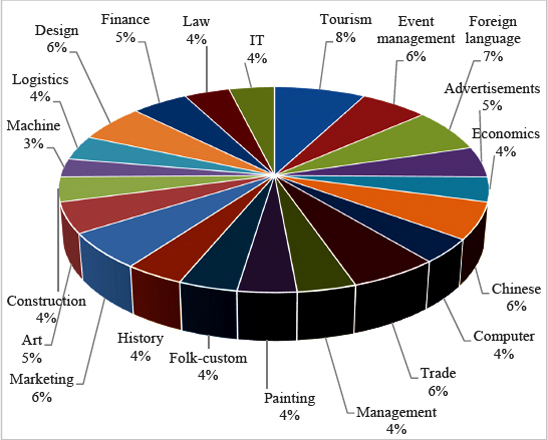
Figure 3: Educational background of employees in the event industry.
3.1 Event management requires planning skills
Figure 3 shows that education background of the people working in the event industry is rather balanced, which means the industry requires various knowledge to generate creativity. Creativity sounds fancy however is based on the understanding of customers’ needs and discovering their unmet requirements. Although the 7,200 exhibitions held each year in China cover almost all industries, there are still a number of unsatisfied needs that remain to be discovered. It is up to talents in the event industry to find them.
3.2 Events need integrative capabilities
When it comes to exhibitions, the organiser acts as a ‘bridge’ and ‘platform’. All of the stakeholders are brought together on this platform. Talents in the event industry should have the capability to make full use of their advantages and to integrate them. As Figure 4 shows, a feasibility report should first be prepared according to the industry’s needs. After obtaining recognition from industry associations and government approval, the project can be launched. When information about industry association members is used properly, exhibitors can be recruited more smoothly; Government in China usually provides financial support to large size exhibitions (for example, an exhibition with 100,000 square metres), this is also a good financial resource to integrate if the number can be reached. After agreeing on the exhibition, organisers may need help from downstream service providers in the industry chain, such as the media, the contractor and the transporter. The core competencies of talents in the event industry comprise knowing how to exploit their advantages, finding key people and associations so as to achieve the goals, and drawing upon mutual benefits.
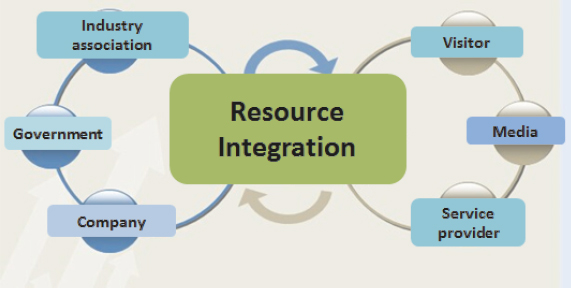
Figure 4: Resource integration.
3.3 Events need marketing capabilities
If we take creativity and planning as the starting points for marketing, finding creative tools is a must to boost the marketing efficiency. Nowadays, in the era of big data, information spreads rapidly and intensively; the traditional 4P theory seems not enough. On the basis of developing the traditional 4P marketing theory, we need to master many innovative methods and logic, such as integrating the transmission (integration) of online and offline marketing methods as well as integrating the internet and mobile internet, which has already changed not only relationships between people, but also our traditional way of thinking. Furthermore, as to the innovation of marketing, another two Ps should be taken into consideration, namely People and Presentation. Being people oriented and serving people with our hearts require us to present well to convey this kind of service to our clients. An outstanding presentation is the main key to success.
3.4 Events need executive capabilities
A successful event requires all kinds of tasks to be done. Organising and managing an event is like operating a delicate machine. As mentioned above, an error with any part can cause the whole project to fail. Details decide about success or failure, which means that the project manager should be able to control each section completely, efficiently and accurately. Event talents should therefore be clear-minded, highly efficient, and result-and action-oriented.
4 Requirements of talents for the future event industry
The so-called ‘o2o event’ (offline to online event) and the seamless integration with mobile internet will be the future of exhibitions. As big data, cloud computing, internet platforms and mobile internet have become inseparable from people’s working lives, the placement of the new economy and new technology will be key to the pace at which the event industry develops. As Figure 5 shows, the event information system is based on modern information technologies that provide a platform for interaction. It encourages exhibitors to present information on this platform and invite visitors to join in, aiming simultaneously at hosting a virtual event on the platform. It collects their interactive behaviour using the big data method, which will be analysed and used to build a more stable and continuing business relationship between exhibitors and visitors. Therefore, today, with the rapid development of technology, the event industry needs managers who keep up with the times. As well as learning traditional knowledge, people should also ensure they understand and use modern information technologies, which will become the key skills required to lead the event industry in the future.
5 Suggestions to event educators
From our experience as event initiators, we can make the following suggestions to event educators.
1.Systematically combine event education and event companies, and explore dual education.
2.Teaching and training are both important when cultivating event talents.
3.Economic globalisation will definitely lead to the globalisation of events. Train more international talents.
4.Greater attention should be paid to the new economy such as mobile internet, which is bound to change and lead the development of the event industry
Finally, here are five suggestions for students interested in entering the event industry.
1.Learn more theoretical knowledge at school. The two most important subjects are marketing and project management, which will equip you with a sound theoretical foundation.
2.Work hard to learn English well, which will make you more competitive, ensuring there are no barriers to your career.
3.Go to event companies. Work in a call centre. After half a year of hard work, you will have improved considerably. If you were the star employee in the course of those six months, project managers will be wanting to recruit you.
4.Participate in events. Work as a trainee and, at the same time, watch, join in and take notes as much as possible. There is no doubt that you will be chosen to join the best event companies.
5.In your event career, these three elements will make you outstanding.
– Ten per cent is professional knowledge at university, which gives you a sound theoretical foundation.
– Forty per cent is communication skills, helping you to gain support from your clients and cooperation partners.
– The remaining 50 per cent depends on your reliability. Reliability will help you gain the continuing trust of your partners and clients, ensuring their permanent support.
6 Literature
China Convention and Exhibition Society/CCES (2014): China Event industry Development Report in 2014
Wang, J. and Li, J. (2011), Investigation and Analysis of the Needs for Professional Exhibition Talents-Shanghai as an example. Online: http://www.cces2006.org/yjcg/2011-5/6845.shtml (accessed on 30 Jun. 2014)
Xin, S. (2010), Shanghai Released a White Book for the Four Centre Construction [![]()
![]() ]. Online: http://finance.sina.com.cn/stock/y/20101112/01108941128.shtml (accessed on 05 Jul. 2014)
]. Online: http://finance.sina.com.cn/stock/y/20101112/01108941128.shtml (accessed on 05 Jul. 2014)
Zhang, J. (2004), Investigation and Analysis of the German Exhibition Education System, Issue 17 in 2004
Jiao, W. (2013), Research on Present Situation and Countermeasures of China’s Exhibition Industry, Issue 18 in 2013
Chen, T., Yuan, Y. and Yuan, P. (2011), The Definition, Characteristics and the Connotation of China High-level Service Industry, Issue 13 in 2011
Hamburg Exhibition Company/HMC (2014), 2014 Annual Report
Xu, J. (2014), Event Education [![]() ]. Online: http://expo.ce.cn/sy/gd/201411/14/t20141114_3906105.shtml (accessed on 07 Oct. 2014)
]. Online: http://expo.ce.cn/sy/gd/201411/14/t20141114_3906105.shtml (accessed on 07 Oct. 2014)
